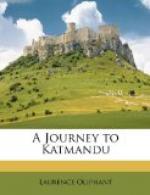Having finished our inspection, and the pay of an unsuccessful mahout or two having been stopped, Jung entered into a long disquisition upon the subject of the wild sports of the Terai. He told us, amongst other things, that he had forbidden all deer-shooting here, although the revenue to Government upon the skins amounted to 400 or 500 pounds a year, in order that he might enjoy better shooting. Of course, we praised the love of sport which could prompt such an order, and said nothing of the love of country which might perhaps have prevented it. I was often struck by the despotic tone which the prime minister assumed, and it only confirmed my previous opinion as to his substantially possessing the sovereign power.
We killed five or six more deer and pigs before quitting Bisoleah on the following day, our road to Bechiacor leading us through the great forest, at this season perfectly healthy. We found our camp pitched in the broad dry bed of a mountain torrent, which I observed to be filled with fragments of granite and micaceous schist.
As the shades of evening closed in upon the valley, the scene became extremely interesting: high upon the hill sides,—for we had reached the base of the Cheriagotty hills,—groups of natives, crouching round their fires, were sheltered only by grass huts, the labour of an hour. While lights twinkled in the minister’s camp, soldiers were gathered round their watch-fires, and the villagers were assembled near a huge crackling blaze to witness so unusual, and to them so exciting a scene, as 5000 souls encamped in their solitary valley.
CHAPTER V.
March to Hetowra—Cross the Cheriagotty Hills—Scenes of the war of 1815- 16—Preparations for a wild-elephant hunt—The herd in full cry—A breakneck country—Furious charges of wild elephants—The lost child—Return to camp.
Early on the following morning we were on the march, and for five miles did our clumsy elephant trip it heavily over the large stones forming the bed of the stream in which we had been encamped the previous night. I fear the beauty of the scenery did not so well compensate him for the badness of the road as his more fortunate riders. To see a hill at a distance after having travelled so long over a dead level was refreshing; but when we began to wind round the base of precipitous cliffs, or clamber up some romantic mountain pass, the effect was most animating.
The cliffs which now frowned over us were about 500 feet in height; a few larches crowning the summit indicated the elevation of the country, and almost reminded us of home, until some monkeys swinging about amongst the branches at once dispelled the illusion.
The hills themselves consist entirely of clay mixed with sandstone, mica, and gravel; and the effect of the mountain torrents during the rainy season upon such soft material had been to form precipitous gullies, along which we were now passing, while the grotesque pinnacles which constantly met the eye reminded us of the dolomite formation of the Tyrol. In many places were strata, sometimes horizontal, but more frequently inclined at an angle of about forty-five degrees, consisting of limestone, hornstone, and conglomerate.




